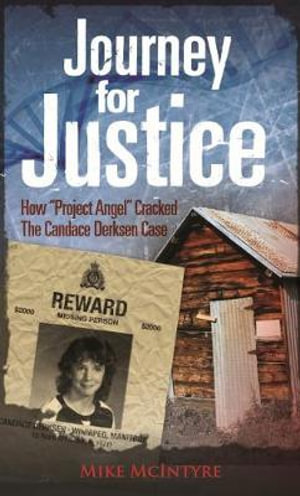All of us in first year CreComm read the book Journey for Justice by Winnipeg Free Press crime reporter Mike McIntyre. The book covers the kidnapping and murder of Candace Derksen. As a parent I found the book hard to read at times. This is without a doubt every parents worst nightmare, and I think it would be hard for many couples to deal with something like this and still keep their love strong and family together. What I got out of the book above all else is a respect for Cliff and Wilma Derksen for the way they dealt with something so horrific.

The book is split into three parts and part one is by far the most readable. It covers the period when Candace went missing and what her family went through before the discovery of her body. What was the most interesting to me about this was how people can deal with not knowing. If a loved one went missing the mind would never turn off. Every doorbell of phone call would be a glimmer of hope followed by disappointment when it wasn't the news that you want to hear. This could lead many people to extreme anxiety or depression.
The book works so well in part one because it reads like a story and really makes the reader feel for what this family is dealing with. It also creates emotion by showing how the Winnipeg Police dealt with the family and some of the accusations that were made towards them. Losing a loved one would be hard enough and would only be made worse if the person who lost their loved one was being accused of wrong doing. The whole scenario is simply unthinkable.
 |
| Cliff and Wilma Derksen |
The other thing that came through clear in the book was the role that faith played in helping the Derksens heal. I am not a religious person but the book gave me true sense of how faith in God helped the Derksens through this tragedy. I also got a sense of how faith helped them to forgive Mark Grant, the man who caused them years of pain and suffering.
The book did seem harder to read in the parts two and three, as it got into more of the logistics of the Mark Grant trail and verdict, and also seemed to use long passages of quotes that sometimes seemed unnecessary. This changed the tone of the book. It seemed like a novel in part one but by the end it almost felt like I was reading a text book at times.
 |
| Mark Grant |
The book did seem harder to read in the parts two and three, as it got into more of the logistics of the Mark Grant trail and verdict, and also seemed to use long passages of quotes that sometimes seemed unnecessary. This changed the tone of the book. It seemed like a novel in part one but by the end it almost felt like I was reading a text book at times.
As an aspiring journalists the book taught me that quotes are great if they progress a story but should never feel like they are there just there for the sake of it. With that being said, I think the book was very well written and I believe that a book like this would be difficult to write, considering that many people involved would probably be reluctant to talk.
Journey for Justice works because it comes from an author who is friends with the parents of the victim. This gives the book some heart which is something that many crime books lack. An example of this is a book I read called The Killer Book of Cold Cases. This book goes purely for the sensationalist and gory details of crime stories and even features a cover with skulls and police tape. It works for what it is trying to accomplish but is a completely different kind of book than Journey for Justice.

Journey for Justice is also different from McIntyre's stories in the Winnipeg Free Press because a book can show so much more of the emotional side of stories. When he spoke to us he said that when he writes articles he is forced to leave lots of information out of stories because his word limit won't allow for much more than the basic information of a story.
The most powerful part of all of this for me was hearing Wilma Derksen speak to us. She is a picture of strength and poise. She talked fondly about the memories of her daughter and also spoke about her respect for Mike McIntyre and the work that he has done She said about his book "When I read it I was amazed. What a wonderful summary of something that took twenty-six years to live."
For Mike McIntyre I'm sure there can be no greater endorsement of his work.